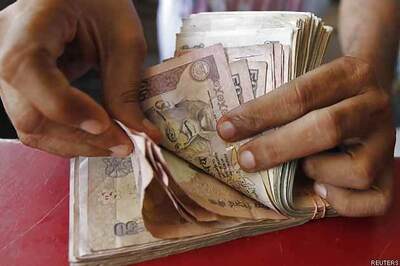
views
Much as the 19th American philosopher, Ralph Waldo Emerson, believed that all the world loved a lover, the fact was quite something else. It continues to be quite something else, and we have seen how star-crossed lovers from the days of Shakespeare's 1597 Romeo and Juliet have been shamed, shunned and even strangulated. If the 16th-century Shakespearean lovers died merely because they belonged to two warring families, the mindset of men has unfortunately remained stuck in a time warp. They continue to chase, chastise, humiliate and hurt a man and a woman if they happen to hail from different castes or religions. The reason can be just about anything, even the fact that a couple in love happen to have been born under the same gothra – a feature we in India have been witnessing with horror.
So, it comes as such a welcome relief that India's Supreme Court has adopted a tough stand against honour killings. Village Khap panchayats, which have become all-too-powerful, draconian and dictatorial, were asked by the country's highest judicial body not to interfere in inter-caste and inter-faith marriages. The panchayats, whose writ rules decisively in rural areas, were told not to be the conscience keepers of society.
“If people decide to marry, they are adults and you are nobody to interfere,” Chief Justice Dipak Misra said in response to a plea seeking to ban khap panchayats and establish guidelines to check growing instances of honour killing taking place in the name of caste and religion. A Bench headed by Justice Misra added that under the law, when two people marry, no third party could interfere in an individual or collective capacity.
I am happy that the Supreme Court chose to talk about an issue as horrendous as honour killing. A BBC report had estimated that year after year over 20,000 women were being murdered the world over – especially in Asia – because they fell in love with men whom their families or communities considered unsuitable.
According to India's National Crime Records Bureau, honour killings in the country jumped by 796 per cent in a matter of two years, 2014 and 2015. While 28 such murders were reported in 2014, the number shot up to 251 the following year. Most cases were seen in Uttar Pradesh, followed by Gujarat and Madhya Pradesh.
The moot point now is, will the Supreme Court ruling be followed by a people steeped in prejudices and drunk on power. In many parts of Asia, marriage has often been viewed as one between two families, rather than two individuals, and considerations other than love have been the deciding factors for the union. Wealth, political favours and the like have been the guiding forces why parents push their son or daughter into marriage. The couple's likes and dislikes are ignored. And murder most foul is committed in the most casual manner when a couple disobeys the family.
In 2016, I remember seeing the video recording of an actual honour killing at a busy road intersection in Udumalpet, near Coimbatore – where 22-year-old Dalit youth, Shankar, and his 19-year-old upper caste wife, Kausalya, were hacked to death by motorcycle-borne men. Shanker died on the street, while Kausalya remained critical for several days before dying. Her father handed himself over to the police, no trace of regret or remorse at having butchered his own daughter.
Cinema has been a mighty crusader against this societal evil. A 2011 film by Avantika Hari, Land Gold Women, takes a hard look at a small British Asian family in modern Birmingham, where the daughter commits the unpardonable crime of falling in love with a white boy. Her uncle, who arrives from India, pressures the parents of the girl to view this affair as a blot on the family’s honour and to get rid of her!
A later Bollywood movie NH 10 narrates the horrific tale of a young woman and her lover being butchered by her brother, while her mother calmly prays for the resurrection of family honour that had been sullied by the elopement of the couple. The lover, a young man, a low-caste Hindu, had “sinned” by desiring a woman from an upper caste.
Bikas Ranjan Mishra’s Chauranga, came as a powerful indictment of honour killing. A low-caste Dalit teenager, a pig-rearer, makes the fatal mistake of taking a fancy for a schoolgirl, whose land-owning father is an upper caste Hindu. The boy writes a love letter to the girl, and the father happens to read it, and it is Hell after that. The boy and his slightly older brother are beaten, and one of them is bludgeoned to death. Mishra, while elaborating the bestiality of it all in his fiction feature, inspired by an actual incident in central India, exposes the hypocrisy of the father, who has no qualms, whatsoever, about sleeping with the mother of the boys!
A Tamil movie, Yenru Thaniyum by Bharathi Krishnakumar graphically narrated a story about honour killing.The female protagonist, Amudha (played by Chanthana) , feels that caste prejudices have become “omnipotent”. A victim of honour killing, she is shocked by caste arrogance and humanity devoid of humanism. Her lover, Thangadurai (Yuvan Mayalsamy), is murdered. Later, Amudha’s brother becomes vengeful.
These kinds of movies can certainly help, but education at all levels may have a greater impact, and bring about a change in a community's way of thinking. If schools and colleges can teach the values of personal choices, adult education in villages and towns will undoubtedly bring about winds of change. But for all this to be effective, khap panchayats need to stop interfering with what has to be seen as the freedom to chose and live with a partner of one's choice.
(Gautaman Bhaskaran is an author, commentator and movie critic)


















Comments
0 comment